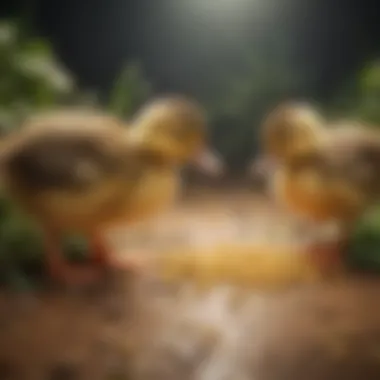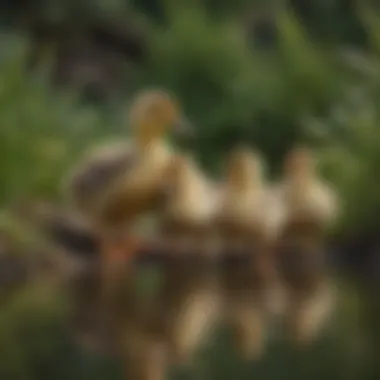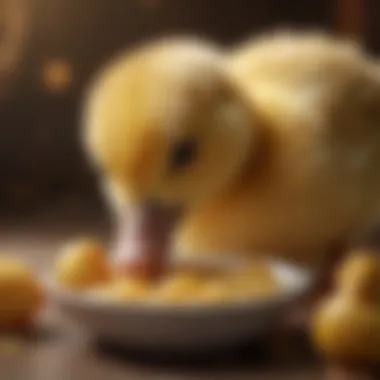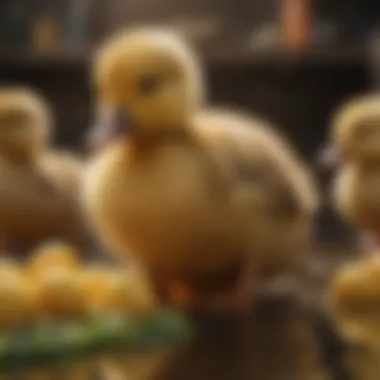Nourishing Ducklings: A Complete Guide to Their Diet


Intro
In order to provide ducklings with the best care, it is crucial to understand their diet. The nutritional needs of ducklings vary significantly as they grow. From the moment they hatch, ducklings require a balanced diet that supports their rapid growth and development. One must consider the diversity of the food they consume, as each type contributes uniquely to their health.
Many misconceptions exist regarding what constitutes a proper diet. Some pet owners may assume that ducklings can thrive on bird seed or general poultry feed alone. However, this narrow view can lead to nutritional deficiencies, impacting their well-being. Therefore, detailed knowledge about their dietary needs is essential for anyone who keeps these birds.
This article explores the various aspects of duckling nutrition, covering suitable foods and the significance of a varied diet. The goal is to ensure that ducklings receive the nutrients necessary for their development and health, guiding pet owners and enthusiasts in nurturing their young ducks properly.
Intro to Ducklings' Diet
The diet of ducklings is a crucial aspect of their overall health and development. Understanding what to feed these young birds can significantly affect their growth rates, vitality, and long-term well-being. Proper nutrition in the early stages of their life facilitates not only physical development but also impacts their behavior and resistance to diseases. A sound approach to feeding ducklings helps ensure they reach adulthood strong and healthy.
The Importance of Nutrition
Nutrition plays a vital role in the early life of ducklings. Essential nutrients provide the energy needed for daily activities, support rapid growth, and aid in the development of immune systems. Ducklings require a balanced diet containing proteins, carbohydrates, fats, vitamins, and minerals. Each of these components serves a specific purpose that contributes to their general health. For instance, proteins function as building blocks for tissue development, while fats serve as concentrated energy sources. Additional vitamins and minerals are crucial for various bodily functions and overall metabolic performance.
Feeding ducklings correctly not only enhances their immediate growth but also sets the foundation for their future health. Ducklings offered a nutritious diet tend to display better feather development, more robust bone structure, and improved behavior. Thus, understanding nutrition is not merely an academic exercise but a practical means of promoting healthy duckling care.
Life Stages of Ducklings
Ducklings undergo several development stages as they grow. Each stage has unique dietary needs that reflect their growth patterns and energy requirements. The first few weeks of life are particularly critical. During this stage, ducklings rely heavily on their initial supply of nutrients from what they consume. After hatching, they require starter feeds that are high in protein to support their rapid growth.
As they transition into the subsequent life stages, their nutritional requirements will change. Young birds will still need high-quality protein but will also benefit from increased variety in their diet, including grains and vegetables.
At maturity, the diet can shift to either breeder or maintenance formulas, depending on whether the ducklings will be raised for meat or for laying eggs. Therefore, understanding these stages allows duck owners to adapt feeding practices to meet the evolving needs of their ducklings effectively.
Basic Nutritional Needs
Understanding the basic nutritional needs of ducklings is crucial for their growth and well-being. Proper nutrition lays the foundation for healthy development, supports immune function, and promotes overall vitality. Each component of their diet serves a specific purpose, making it essential to be aware of what to include in their feeding regimen.
Ducklings, much like other young animals, have special requirements that differ significantly from adults. This is due to stages of life where they require higher levels of certain nutrients to support rapid growth and development. Thus, addressing these basic nutritional needs is imperative for anyone caring for ducklings.
Proteins: The Building Blocks
Proteins are vital for ducklings as they contribute to building and repairing tissues. These nutrients are made up of amino acids, some of which cannot be synthesized by the body and must be obtained through food. Young ducklings need a higher protein intake compared to adults, often around 20% to 24% of their diet exclusively comprised of proteins.
Common sources of protein for ducklings include:
- Commercial duckling feed: Specifically formulated feeds that provide the necessary balance of protein.
- Insects: Mealworms and crickets serve as excellent protein-rich snacks.
- Cooked eggs: While soft and easy to digest, eggs should be served in moderation.
Ensuring adequate protein intake will aid in muscle development and enhance the overall health of ducklings.
Carbohydrates for Energy
Carbohydrates serve as the primary energy source for ducklings. Young birds are very active, requiring energy for daily activities such as foraging and social interactions. Complex carbohydrates, with fiber content, promote healthy digestion and provide lasting energy.
Food options rich in carbohydrates include:
- Grains: Whole grains such as oats and wheat are well-suited for ducklings.
- Vegetables: Leafy greens and root vegetables are both nutritious and energy-providing.
- Fruits: Moderation is key, as fruits like berries offer both carbohydrates and vitamins.
A balanced intake of carbohydrates is essential for maintaining their energy levels and supporting their growth.
Fats: An Essential Component
Fats are often underestimated in discussions about nutrition, yet they are critical for ducklings. Fats provide a concentrated source of energy and assist in the absorption of fat-soluble vitamins. Essential fatty acids, which cannot be synthesized by ducklings themselves, must be part of their diet as they play a key role in brain development and overall health.
Sources of healthy fats include:


- Fish oils: Can enhance the growth rate and health of ducklings.
- Seed meals: Flaxseed or sunflower seeds contribute beneficial fatty acids.
- Animal fats: Small amounts can also be beneficial if sourced appropriately.
Correct amounts of dietary fats can help ducklings achieve their growth potential.
Vitamins and Minerals
Vitamins and minerals support various functions in ducklings, such as bone health, immune system support, and metabolic processes. A deficiency in these components can lead to serious health problems. Balanced diets typically incorporate a range of vitamins and minerals to ensure ducklings are nourished properly.
Important vitamins and minerals include:
- Calcium and phosphorus: Crucial for bone development.
- Vitamin A: Essential for vision and skin health.
- B vitamins: Aid in energy metabolism and growth.
- Vitamin D: Helps in calcium absorption.
Supplying ducklings with a diverse range of nutrients ensures they develop healthily and thrive in their environment. Regular monitoring of their dietary intake allows for adjustments to be made, ensuring their nutritional needs are met.
Natural Diet of Ducklings
The natural diet of ducklings plays a crucial role in their growth and overall health. Understanding what constitutes a duckling's natural diet informs pet owners about how to mimic it through both foraging and structured feeding. A balanced and diverse diet not only supports growth but also helps build a robust immune system. This section aims to elucidate the typical forage of ducklings, highlighting essential food sources and their benefits.
What Ducklings Forage For
Ducklings intuitively seek a range of food items, predominantly found in their natural habitats. Their forage consists of various aquatic and terrestrial materials. Commonly, they feed on small insects, seeds, and tender plant parts.
Key items ducklings tend to forage include:
- Insects: These provide necessary protein for growth.
- Aquatic plants: Their green parts are rich in vitamins and minerals.
- Grains: Such as seeds which offer energy-rich carbohydrates.
The act of foraging encourages natural behaviors, aiding their development emotionally and socially.
Insects and Small Creatures
Insects constitute a significant part of a duckling's diet. They are protein-rich and aid in muscle development and tissue growth. Among insects, ducklings enjoy various types such as:
- Ants and beetles, which are abundant and easily accessible in many areas.
- Worms provide essential nutrients, further enriching their diet.
- Small crustaceans from their aquatic environments are also favored.
Finding these insects requires a keen sense of curiosity and exploration within their habitat. Raising ducklings with access to areas rich in insects supports naturally healthy eating habits.
Aquatic Plants and Grains
Aquatic plants also play a vital role in the duckling's natural diet. These plants not only serve as food sources but also offer a habitat. Ducklings feed on soft parts of aquatic plants like lily pads and duckweed, both of which provide necessary vitamins and minerals.
In terms of grains, ducklings will feed on seeds found on the ground or floating in water. The primary benefits of grains include:
- Energy production: They are an excellent source of carbohydrates.
- Essential nutrients: They help in overall development and health.
Commercial Duckling Feed
Incorporating commercial duckling feed into the diet of young ducks is fundamentally beneficial. It ensures that the birds receive balanced nutrition in a controlled manner. This option caters to pet owners who seek to provide quality nourishment without the need to source and mix their own feed. Commercial feeds are formulated with specific ratios of proteins, carbohydrates, fats, vitamins, and minerals that are critical during the growth phase of ducklings.
Types of Commercial Feeds Available
There are various formulations of commercial duckling feeds available on the market. These typically include:
- Starter Crumbles: Designed for the earliest stage, containing higher protein percentages to support initial growth.
- Grower Pellets: Suitable for older ducklings, these feeds often reduce protein but increase energy sources to sustain rapid growth.
- Finisher Feeds: As the name implies, these are meant for nearing maturity, providing the right mix for muscular development and weight management.
Each type plays a special role in the dietary journey of ducklings. Pet owners should choose feeds appropriately according to the age of the birds to optimize growth and health.
Reading Ingredient Labels
Being knowledgeable about ingredient labels on commercial feeds is essential for making informed purchasing decisions. A good ingredient label reveals the source and quality of nutrients. Look for:


- First Ingredients: Proteins should be at the top, such as soybean meal or fish meal, to indicate quality.
- Supplements: Check for the presence of essential vitamins and minerals like calcium, phosphorus, and Vitamin D, which are key for bone health.
- Avoid Fillers: Ingredients like corn or barley should not dominate the label, as they may lower the nutritional value.
"A well-informed choice regarding commercial feed can set the pathway to a healthier decorative flock or productive poultry operation."
Choosing the Right Feed for Ducklings
Selecting the right feed requires understanding the specific needs of your ducklings. Consider the following factors:
- Age: Different life stages have distinct nutritional requirements, so choosing the right stage feed is crucial.
- Purpose: Ducks raised for egg-laying require different nutrients compared to those raised for meat.
- Local Availability: Some brands may not be accessible in every region. Ensuring that you can source your preferred feed regularly is vital for ongoing health.
By aligning the feed choice with the age, purpose, and availability, a pet owner can provide a more tailored diet, promoting robust health and development in ducklings.
Feeding Practices
Feeding practices are essential for the well-being of ducklings. Proper feeding methods ensure that these young birds receive adequate nutrition necessary for their growth and development. Without a clear understanding of effective feeding practices, caregivers may inadvertently hinder the development of their ducklings. This section focuses on creating a feeding schedule, controlling the portions of food provided, and observing duckling behavior to attain this goal.
Creating a Feeding Schedule
Establishing a feeding schedule is critical to the health of ducklings. Young ducklings benefit from regular feeding intervals. A consistent schedule helps regulate their digestive system and allows for proper nutrient absorption. For instance, feeding ducklings three to four times a day during their early weeks can support optimal growth. As they mature, the frequency of feeding can be adjusted to two or three times a day. It is important to consider their age when setting this schedule, as their nutrient needs will change over time. Additionally, keeping to a routine can make it easier for caregivers to monitor their food intake and adjust as necessary.
Controlling Portions
Portion control is another significant aspect of feeding practices. Overfeeding can lead to obesity and related health problems for ducklings. Caregivers should provide the right amount of food based on the ducklings' age and size. A general guideline is to offer enough food that they can consume within 20 to 30 minutes. If food remains after this time, it may indicate that the portions are too large. Monitoring how much the ducklings eat during each feeding will help in adjusting the portions. Moreover, it's important to provide fresh food daily and to remove any uneaten food to prevent spoilage.
Observing Duckling Behavior
Observing duckling behavior is crucial in understanding their dietary needs. Ducklings communicate their hunger or satiety through various actions. Signs of hunger may include pecking at the food and vocalizations, while signs of fullness may involve them distancing themselves from food or becoming less active. Each duckling is unique, and understanding individual eating patterns can help tailor feeding practices effectively. Being attentive to their behavior helps in making informed decisions about adjustments to their diet or schedule.
"Observation is the key to understanding the dietary nuances of ducklings, allowing for a customized approach that enhances their well-being."
Common Feeding Mistakes
Feeding ducklings is more involved than simply scattering grain. Understanding common feeding mistakes is crucial to ensure these delicate creatures thrive. Pet owners must recognize that missteps in their diet can lead to dire consequences. This section focuses on the most prevalent errors in duckling feeding practices, their explanation, and the benefits of avoiding them.
Overfeeding and Its Consequences
Overfeeding ducklings may seem harmless, but it can lead to serious health issues. Excessive food intake can cause obesity, which puts strain on their joints and can lead to metabolic disorders. Ducklings have high energy needs but also require moderation in feeding.
Pet owners should pay attention to the recommended amounts for the specific stage of growth. A daily feeding guide ensures that ducklings receive adequate nutrition without excess. Fostering a healthy growth rate will enhance their overall development.
Neglecting Fresh Water
Water is often overlooked in ducklings’ diets but is essential. Ducklings need constant access to fresh, clean water. They use it not only for drinking but also for rinsing their beaks and food.
Failing to provide sufficient water can lead to dehydration, impacting their growth and health. Notably, ducklings submerged in foul water can risk exposure to harmful bacteria. Thus, maintaining a hygiene-rich environment is key. Use clean containers and refill them frequently to keep the water fresh.
Inadequate Nutrition Mix
Ducklings require a balanced diet that includes a variety of nutrients. Relying solely on grain, for instance, can lead to nutritional deficiencies. A good mix of proteins, vitamins, and minerals is necessary for optimal growth.
Avoid using low-quality feeds that lack essential nutrients. Researching and selecting a well-balanced feed is vital. Attention must also be given to integrating natural forages like insects and greens into their diet. This variety helps in meeting their comprehensive nutritional needs and promotes overall health.
"Proper nutrition is a pillar of health in ducklings; understanding dietary mistakes can prevent health complications down the road."
Proper feeding practices contribute to the well-being of ducklings. Being aware of these common pitfalls helps ensure that they grow strong and healthy.
Health Implications of Poor Feeding


Feeding ducklings properly is perhaps one of the utmost important responsibilities for their caretakers. Mismanagement in their diet can lead to serious health repercussions. It may not seem like a pressing issue at first, but the long-term effects of poor nutrition can severely impact the wellbeing of these young birds. A balanced diet provides the necessary nutrients for growth, energy, and overall health, without it, ducklings may encounter several avoidable problems. Knowing the implications is crucial for pet duck owners to become successful in nurturing healthy ducklings.
Common Health Issues in Ducklings
Ducklings, if not fed appropriately, can suffer from various health problems. Here are a few common issues:
- Obesity: Overfeeding leads to obesity, which introduces a range of related problems, including heart disease and joint issues.
- Metabolic Disorders: An imbalance of nutrients can lead to metabolic disorders, resulting in slow growth and even deformities.
- Digestive Problems: Poor diets can disrupt the digestive system, causing diarrhea or constipation.
- Vitamin Deficiency: A lack of essential vitamins, especially A and D, can result in impairments in growth, feathering, or even eyesight.
A balanced diet ensures that ducklings receive all the nutrients they need to thrive, affecting everything from their feathers to their activity levels. Regular monitoring of their health will help identify potential issues early on, allowing for timely intervention.
Impact on Growth and Development
The growth and development of ducklings are directly proportional to their diet. Poor feeding practices can stifle their progress in several ways:
- Slower Growth Rates: Essential proteins and vitamins are vital for muscle and bone development. Lack of these nutrients may result in much slower growth.
- Weak Immune System: A nutrition deficit weakens their immunity, making them susceptible to infections and diseases.
- Behavioral Issues: Nutrition impacts not only physical health but also behavior. Poorly fed ducklings might show lethargy or aggression.
Considering these points, an effective feeding strategy is not merely a preference but a necessity. Regular assessments of their dietary intake, alongside close observations of their health, can significantly enhance the growth trajectory of ducklings.
"Proper nutrition ensures both health and longevity for ducklings, making it essential for any responsible owner to prioritize their diet.”
Supplemental Feeding Options
Supplemental feeding options play an essential role in ensuring that ducklings receive the proper nutrition they need for healthy growth. While ducklings often thrive on a quality commercial feed combined with their natural foraging habits, there are times when additional nutrients may be beneficial. This section will delve into when to consider supplements and the types available specifically for ducklings.
When to Consider Supplements
Ducklings have distinct dietary needs during various stages of their development. Supplemental feeding can be important in the following scenarios:
- Growth Spurts: Rapid growth phases may require additional nutrients. This can occur shortly after hatching and during subsequent growth periods.
- Stress Factors: Environmental changes, illness, or transition to new living conditions may impact a duckling's appetite, making supplementation desirable.
- Inadequate Diet: If the natural foraging opportunities are limited, such as in winter months or in small enclosed spaces, supplements can help fill nutritional gaps.
In these situations, it is prudent to evaluate the overall diet and consider enhancing it with specific supplements. This can lead to better health outcomes and spirited growth in ducklings.
Types of Supplements For Ducklings
Several types of supplements are available for ducklings, each serving a unique purpose:
- Vitamin Supplements: These can include vitamins A, D, and E, which are crucial for immunity, bone health, and reproductive functionality. The addition of multivitamin powders can ensure ducklings receive these essential nutrients.
- Mineral Supplements: Calcium and phosphorus are particularly important for developing bones. The imbalance of these minerals can lead to serious health issues. Supplementation can help maintain proper ratios.
- Probiotics: These can support digestive health and improve nutrient absorption. Stress, changes in feed, or other factors can sometimes disrupt the gut flora, making probiotics a useful addition.
- Electrolyte Solutions: In cases of stress or dehydration, electrolyte solutions can help restore balance. These are especially useful during hot weather or after illness.
Having a balanced approach towards supplementation can be beneficial. Understanding the specific needs of ducklings and how supplemental options can play a role will help ensure their health and vitality.
"Proper nutrition is not just about the right feed; it's about being proactive in ensuring ducklings receive everything they require to thrive."
Taking these considerations into account can improve the overall care of ducklings. Evaluating their diet diligently can lead to informed decisions regarding supplements, fostering an environment for optimal growth.
Epilogue
In this section, we underscore the overarching significance of the diet of ducklings. It is essential to understand that proper nutrition lays the groundwork for healthy growth and development. The insights provided serve as a guideline for pet owners and enthusiasts alike, emphasizing that what ducklings consume directly correlates with their physical health and behavior.
Recap of Key Points
To summarize, ducklings require a diet rich in proteins, carbohydrates, fats, vitamins, and minerals to flourish. By foraging for insects and small creatures, they instinctively seek out necessary nutrients. Additionally, the different stages in their life cycle demand a nuanced approach to feeding, underscoring the need for adaptability in dietary choices.
Some essential points to remember include:
- Diverse Diet: Ducklings benefit from a variety of foods, both natural and commercial.
- Feeding Practices: Establishing a routine is crucial for proper growth.
- Health Considerations: Inadequate nutrition can lead to serious health issues.
"A well-balanced diet for ducklings is not just a good practice; it is the key to their overall well-being."
Encouragement for Proper Care
Caring for ducklings is a responsibility that comes with immense rewards. A commitment to maintaining their health through careful dietary choices transforms not just their growth but also the bond between pet owner and animal. This ongoing process invites a deeper understanding of animal welfare, promoting an environment where ducklings can thrive.
Ultimately, the focus should remain on educating oneself about the dietary needs of ducklings. Regular observation of their eating habits and any changes they undergo can guide informed decisions regarding their nourishment. Consider working with veterinarians specializing in avian care to ensure holistic approaches to feeding.
In summary, taking deliberate steps in the care and nutrition of ducklings will yield fruitful results, leading to healthier, more vibrant birds as they grow into adulthood.







